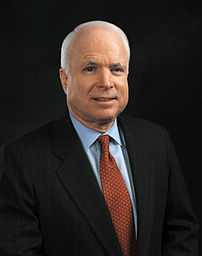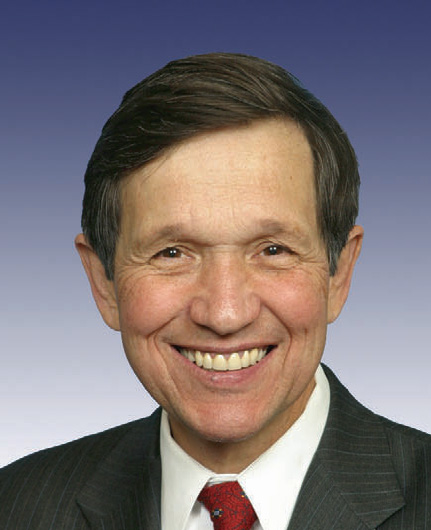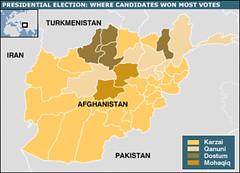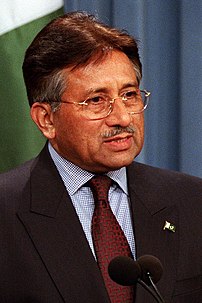Georgia has been sleepless for days, awakened to their worst nightmare by the rash actions of it's President Saakashvili. Although, I've been convinced that Russia had been bellicose and provocative in recent months in all spheres, ever since the independence of Kosovo. I suspect there was "banditry" at the border of
South Ossetia, but in a catastrophic miscalculation, Saakashvili order his troops across the border to route the "bandits" and the South Ossetia irregulars who supported them. They ran head on into Russian "peacekeepers" set in harms way to act as a political justification for Russia to invade.
However, not ready to accept the previous "stagnation" of "negotiation" for "regional autonomy", Putin asserted in Beijing that the rules have changed, a new reality will be imposed. What the reality will be will likely be apparent in days. Georgia is effectively cut in half, it's port is occupied, the main highway between the capital and the east and west sides of the country is in Russian hands. Russian air force control the skies.
Russia can occupy this country in days, but they will face a bloody guerrilla war for many years. It will be another Chechnya. I suspect they will not choose this course. They have demonstrated they intend to destroy the Georgian military and ensure there will be no further incursions in South Ossetia or
Abkhazia. Clearly, Putin will either annex or make independent these two Russian majority provinces of Georgia.
Here are the facts on the ground from the
McClatchy Washington Bureau
Russian forces broadened their crushing offensive against Georgia on Monday, and Georgian officials feared the worst -- that the Russian invasion would mean the end of their country's independence.
Russian troops were reported in control of Georgia's main east-west highway outside the central Georgian town of Gori. In the west, they seized Georgia's main port at Poti, according to the U.S. State Department, and occupied a Georgian military base. In the north, they forced Georgian troops from the disputed city of Tskhinvali. Everywhere, Russian jets had complete dominion of the skies, from which they bombed and strafed retreating Georgians at will.
In Washington, President Bush warned of a "dramatic and brutal escalation" by Russia and said it appeared Russia might be trying to oust Georgia's president, a former Washington lawyer who is a staunch U.S. ally.
Speaking in the White House Rose Garden immediately after flying home from China, Bush said it appeared Russia was moving beyond the original "zone of conflict" and might soon bomb the civilian airport and attack Georgia's capital, Tbilisi.
Georgian President Mikhail Saakashvili, in a nationally broadcast address, said that he'd offered a cease-fire but had been rebuffed.
Russian officials said that Georgian forces were still fighting, however, and a Russian defense spokesman said Saakashvili's offer wasn't "worth a penny."
Col. Gen. Anatoly Nagovitsin, the deputy head of the Russian military's general staff, reiterated his government's bottom line: Russia won't cease fighting until Georgia not only pulls out of the breakaway provinces of South Ossetia and Abkhazia but also signs an agreement never to pursue force against them again.
The United States and Europe pressed for a cease-fire, without effect.
Secretary of State Condoleezza Rice conferred by telephone with foreign ministers from the world's largest economic powers, who also urged Russia to accept a cease-fire and agree to international mediation.
Russian Prime Minister Vladimir Putin chafed at the criticism, likening Russia's moves against Georgia to the U.S.-led invasion of Iraq.
[..]
On Sunday, Russian tanks and jets pounded Georgian troops until they evacuated Tskhinvali, South Ossetia's capital. On Monday, Russian tanks moved to the edge of South Ossetia and toward Georgian-controlled villages there, according to Georgian troops who witnessed the fighting.
Russian aircraft hit the city of Gori, the home of a Georgian military base that sits between Tskhinvali and the Georgian capital, Tbilisi. On Monday, a few buildings, apparently civilian targets, were blasted with holes and scorched by fire.
Early Tuesday, Elene Agladze, who works in the office of the Georgian director of national security, said Russian troops were reported on the outskirts of Gori, though she cautioned that the reports had not been officially confirmed.
[..]
Georgian officials said that Russian troops on Monday also moved beyond the western region of Abkhazia into Georgian-controlled areas, seizing a military base and strengthening a second flank that appeared to be squeezing toward Georgia's capital of Tbilisi.
The leader of Abkhazia, Sergei Bagapsh, told Russian state news agencies that his forces had offered a corridor of escape to Georgian soldiers. "But if they refuse to use it," he said, his men would destroy the Georgians.
A senior State Department official briefing reporters in Washington said Russian troops had also occupied Georgia's main Black Sea port, Poti.
Fear of the next Russian step was everywhere.
Why would President Saakashvili take a chance on an increasingly aggressive Putin? Clearly he knew of the danger, but despite the fact that Russian armored battalions were in striking distance of the border, he tried something he did soon after his election in 2004. He clearly wished to push the Russians back to the negotiation table and enforce the result of the 2004 conflict.
In doing so, he took Putin's bait, called what he thought was his bluff, giving Russia justification to counter attack.
NYTimes.com
But the Georgians are intensely nationalistic, and viewed these de facto states on their border as an intolerable violation of sovereignty. Mr. Saakashvili cashed in on this deep sense of grievance, vowing to restore Georgia's "territorial integrity." Soon after taking office, he succeeded in regaining Georgian control over the southwestern province of Ajara. Then, in the summer of 2004, citing growing banditry and chaos, he sent Interior Ministry troops into South Ossetia. After a series of inconclusive clashes, the troops were forced to make a humiliating withdrawal.
Still, this violation of the status quo infuriated the Russians, and Mr. Saakashvili, for once listening to his few dovish advisors, agreed to seek a negotiated settlement in Abkhazia. By late 2005, a Georgian mediator had initialed an agreement: Georgia would not use force, and the Abkhaz would allow the gradual return of 200,000-plus ethnic Georgians who had fled the violence. But the agreement collapsed in early 2006, done in by hardliners on both sides. This chapter has been all but effaced from the history one hears in Georgia.
[..]
Administration officials have regularly cautioned Mr. Saakashvili to be patient on Abkhazia and South Ossetia, even as they have given private and public reassurances about NATO membership. It would, in fact, be surprising if Georgia had consciously provoked a war in South Ossetia, since Mr. Saakashvili understands that doing so would almost certainly put an end to the NATO bid; indeed, Russia may well calculate that NATO will continue to exclude Georgia so long as the country is embroiled in hostilities along its border.
Georgia's predicament seems very simple from the vantage point of Tbilisi -- 1921, 1938 -- but extremely complicated from a great remove. Russia threatens Georgia, but Georgia threatens Abkhazia and South Ossetia. Russia looks like a crocodile to Georgia, but Georgia looks to Russia like the cats' paw of the West. One party has all the hard power it could want, the other all the soft. And now, while the world was looking elsewhere, the frozen conflict between them has thawed and cracked. It will take a great deal of care and attention even to put things back to where they were before.
![Reblog this post [with Zemanta]](http://img.zemanta.com/reblog_e.png?x-id=18009222-7371-44fd-8444-c154a4ff7380)


![Reblog this post [with Zemanta]](http://img.zemanta.com/reblog_e.png?x-id=f970dd6f-f89a-4d50-a4b3-e7def981efa5)

![Reblog this post [with Zemanta]](http://img.zemanta.com/reblog_e.png?x-id=e4a1f5a9-4d29-4bde-acaf-a319c6e9faae)

![Reblog this post [with Zemanta]](http://img.zemanta.com/reblog_e.png?x-id=20d57fe2-cee5-4247-929d-48e4feab63b0)

![Reblog this post [with Zemanta]](http://img.zemanta.com/reblog_e.png?x-id=c394ae12-085c-4dd8-ba7a-bf4ad3f5bf7e)
![Reblog this post [with Zemanta]](http://img.zemanta.com/reblog_e.png?x-id=923d905e-89af-438d-a5eb-5674dcfa3cfb)

![Reblog this post [with Zemanta]](http://img.zemanta.com/reblog_e.png?x-id=6c7ca40c-e07e-4282-8dee-2717c39e5c04)

![Reblog this post [with Zemanta]](http://img.zemanta.com/reblog_e.png?x-id=43cc176e-c512-4c1f-84f0-14f75608ec12)


![Reblog this post [with Zemanta]](http://img.zemanta.com/reblog_e.png?x-id=be977b19-b28e-4b9b-9198-b59b34800fab)

![Reblog this post [with Zemanta]](http://img.zemanta.com/reblog_e.png?x-id=53ef7d61-95a0-4c50-a219-38486a76895d)

![Reblog this post [with Zemanta]](http://img.zemanta.com/reblog_e.png?x-id=ec2a407d-36c1-493d-82ff-634c5d603802)
![Reblog this post [with Zemanta]](http://img.zemanta.com/reblog_e.png?x-id=3e945b86-d294-42c8-b2d4-2eb285964f51)
![Reblog this post [with Zemanta]](http://img.zemanta.com/reblog_e.png?x-id=c019406b-f024-4c59-a095-f314541bd985)

![Reblog this post [with Zemanta]](http://img.zemanta.com/reblog_e.png?x-id=647fb04e-5f63-47da-860a-9a0591abd14c)

![Reblog this post [with Zemanta]](http://img.zemanta.com/reblog_e.png?x-id=61e7c058-2745-40e2-86e2-92d58dea94a6)

![Reblog this post [with Zemanta]](http://img.zemanta.com/reblog_e.png?x-id=af6b9091-43d6-41ea-ab0f-b8c8847ea2c0)

![Reblog this post [with Zemanta]](http://img.zemanta.com/reblog_e.png?x-id=e0d35ba4-5faf-4e0e-a888-038c9e484550)

![Reblog this post [with Zemanta]](http://img.zemanta.com/reblog_e.png?x-id=59693ac7-d448-4c5e-928a-886d8569b6c6)

![Reblog this post [with Zemanta]](http://img.zemanta.com/reblog_e.png?x-id=0d91ed92-521e-4a44-bb03-32fe9dad3660)
![Reblog this post [with Zemanta]](http://img.zemanta.com/reblog_e.png?x-id=af0c1a83-44e4-4c95-b4be-65323f6c73cd)
![Reblog this post [with Zemanta]](http://img.zemanta.com/reblog_e.png?x-id=49861128-9381-48d0-b054-c470c5fc701c)
![Reblog this post [with Zemanta]](http://img.zemanta.com/reblog_e.png?x-id=d264a5cd-8df1-412d-a77e-a018ee93dee7)
![Reblog this post [with Zemanta]](http://img.zemanta.com/reblog_e.png?x-id=8b779b3e-01b5-4b35-836d-5d2450a03392)

![Reblog this post [with Zemanta]](http://img.zemanta.com/reblog_e.png?x-id=2c35d576-6385-4631-9560-1f83b371e2c0)
![Reblog this post [with Zemanta]](http://img.zemanta.com/reblog_e.png?x-id=18009222-7371-44fd-8444-c154a4ff7380)
